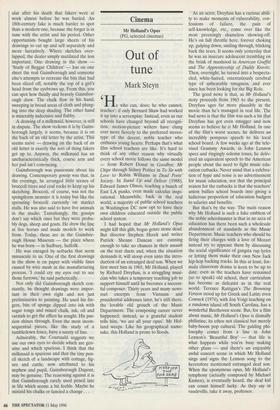Cinema
Mr Holland's Opus (PG, selected cinemas)
Out of tune
Mark Steyn
He who can, does; he who cannot, teaches': if only Bernard Shaw had worked it up into a screenplay. Instead, even as our schools have changed beyond all recogni- tion, motion-picture writers have clung ever more fiercely to the preferred stereo- type of the decent, noble teacher who enthuses young hearts. Perhaps that's what film school teachers are like. It's hard to think of any other reason why virtually every school movie follows the same model — from Robert Donat in Goodbye, Mr Chips through Sidney Poitier in To Sir with Love to Robin Williams in Dead Poets' Society. In Stand Up and Deliver (1988), Edward James Olmos, teaching a bunch of East LA punks, even made calculus inspi- rational. Meanwhile, back in the real world, a majority of public school teachers in Washington DC now opt to have their own children educated outside the public school system.
I had hoped that Mr Holland's Opus might kill this glib, bogus genre stone dead. But director Stephen Herek and writer Patrick Sheane Duncan are cunning enough to take no chances in their assault on the tear ducts and, when the situation demands it, will stoop even unto the intro- duction of an estranged deaf son. When we first meet him in 1965, Mr Holland, played by Richard Dreyfuss, is a struggling musi- cian who takes a temporary teaching job to support himself until he becomes a success- ful composer. Thirty years and many news- reel excerpts from Vietnam and presidential addresses later, he's still there, the lovable old grouch of the Music Department. The composing career never happened; instead, as a grateful student tells him, 'we are all your opus'. Mr Hol- land weeps. Like his geographical name- sake, this Holland is prone to floods. As an actor, Dreyfuss has a curious abili- ty to make moments of vulnerability, con- fessions of failure, the pain of self-knowledge, etc., come over like the most preeningly shameless showing-off. He's on full throttle here, forever choking up, gulping down, smiling through, blinking back the tears. It seems only yesterday that he was an insecure adolescent trembling on the brink of manhood in American Graffiti and The Apprenticeship of Duddy Kravitz. Then, overnight, he turned into a bespecta- cled, white-haired, ostentatiously cerebral type of unbearable smugness, and ever since has been looking for the Big Role.
The good news is that, as Mr Holland's story proceeds from 1965 to the present, Dreyfuss ages far more plausibly in the movie than he's managed in real life. The bad news is that the film was such a hit that Dreyfuss has got even smugger and now seems to believe he is Mr Holland. In one of the film's worst scenes, he delivers an incredibly pompous speech to his local school board. A few weeks ago at the tele- vised Grammy Awards, in John Lennon specs and ringingly solemn tones, he deliv- ered an equivalent speech to the American people about the need to fight music edu- cation cutbacks. Never mind that a celebra- tion of hype and noise is no advertisement for music education, nor that the principal reason for the cutbacks is that the teachers' union bullies school boards into giving a ludicrous proportion of education budgets to salaries and benefits.
But that's by the way. The main reason why Mr Holland is such a fake emblem of the noble schoolmaster is that in no area of education has there been such a wholesale abandonment of standards as the Music Department. Music teachers who should be firing their charges with a love of Mozart instead try to appease them by discussing the social significance of gangsta rap lyrics or letting them make their own New Jack hip-hop backing tracks. In this at least, for- mula classroom drama is keen to be up to date: even as the teachers have remained (so to speak) old school, their curriculum has become as defeatist as in the real world. Terence Rattigan's The Browning Version stood up for Greek and Latin; even Conrack (1974), with Jon Voigt teaching on a rundown island off South Carolina, has a wonderful Beethoven scene. But, for a film about music, Mr Holland's Opus is dismally philistine, its ethos not classical but merely baby-boom pop cultural. The guiding phi- losophy comes from a line in John Lennon's 'Beautiful Boy' — that life is what happens while you're busy making other plans — and there's an enjoyably awful concert scene in which Mr Holland sings and signs the Lennon song to the heretofore mentioned estranged deaf son. When the eponymous opus, Mr Holland's symphony (actually composed by Michael Kamen), is eventually heard, the deaf kid can count himself lucky. As they say in vaudeville, take it away, professor.


































































 Previous page
Previous page